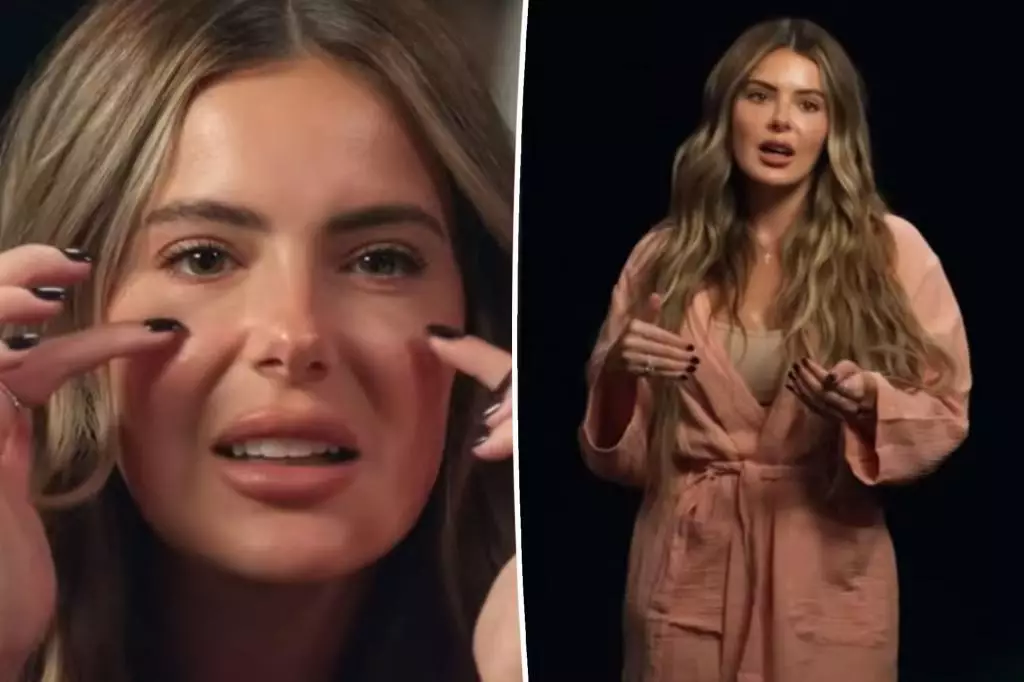In contemporary society, the allure of eternal youth has become a relentless pursuit, often mediated through cosmetic procedures that are increasingly normalized, especially among young women. Brielle Biermann’s candid reflection on her early introduction to fillers offers a revealing glimpse into this complex cultural phenomenon. Growing up in an environment where beauty enhancements were commonplace, she internalized the notion that altering her appearance was not only acceptable but an extension of her identity. This normalization fosters a dangerous misconception: that aging gracefully is no longer achievable, and that perfection necessitates ongoing correction. While social media amplifies these ideals, it also incurs profound personal consequences, as the boundary between natural beauty and artificially manipulated features blurs.
The risk with such normalization is that it diminishes awareness of the potential health implications. Cosmetic procedures, particularly when initiated at a young age, carry inherent risks—from uneven results to long-term tissue damage. Brielle’s admission of her dissatisfaction with under-eye filler, and the asymmetry it caused, exemplifies this danger. When procedures are driven by insecurity shaped partly by societal pressures, the line between confidence and obsession becomes dangerously thin. The cultural consensus often dismisses these concerns as superficial, yet the emotional toll—self-esteem issues, regret, and insecurity—can be profound. Consequently, what is portrayed as a simple beauty fix may mask deeper psychological vulnerabilities.
The Influence of Parental Roles and Family Dynamics in Beauty Choices
In examining Brielle’s narrative, it becomes evident that familial influence plays a significant role in shaping perceptions of beauty and acceptance of cosmetic interventions. Her mother, Kim Zolciak, exemplifies how parental normalization of procedures impacts children’s choices. Growing up in a household where Botox and fillers were routine, Brielle’s perception of beauty was heavily modeled on her mother’s experience. This environment subtly eroded any hesitation about cosmetic enhancements, framing them as normal, even necessary. It also reveals a broader societal pattern: parents, often unknowingly, influence their children’s body image and comfort with aesthetic alterations.
The dynamics of this influence raise critical questions about autonomy and informed decision-making. When cosmetic procedures are normalized within the family context, especially at an impressionable age, they become less about personal choice and more about conformity to perceived standards. Furthermore, the fact that Brielle was accustomed to accompany her mother during treatments indicates a form of social conditioning—procedures were seen as routine, a normal part of life, rather than significant medical decisions. This paternalistic normalization risks fostering a cycle where insecurities are perpetuated and compounded across generations, leaving young women ill-prepared to critically assess their motivations and well-being.
The Commercial Pressures and Social Media’s Role in Beauty Trends
Brielle’s insights also highlight how the commercial beauty industry leverages social media to shape and profit from insecurities. As a social media influencer, her acknowledgment of the need to maintain a curated appearance reveals an underlying paradox: the pursuit of authenticity becomes intertwined with performative perfection. The industry’s aggressive marketing strategies—offering free or discounted procedures to influencers—fuel a cycle of constant correction, making cosmetic enhancement not just a personal choice but a branding necessity. This commodification of beauty fosters a culture where flawlessness equates to success, forcing individuals to chase impossible standards to stay relevant or admired.
Furthermore, social media platforms accelerate the spread of aesthetic trends that often border on the surreal or unnatural, exemplified by the popularity of plumped cheeks or dramatic lip fillers. The public scrutiny of celebrities like Hilary Duff, with comments on “Madonna-esque” enhancements, underscores a societal obsession with perfection that often disregards the health and emotional costs involved. Jennifer Garner’s cautious stance is a breath of reality amid the glamorized narratives pushed by the industry. It provides a stark reminder that genuine self-esteem is often sacrificed on the altar of superficial beauty, creating a landscape where natural aging is seen as a flaw rather than a facet of authentic human experience.
The Psychological Consequences and the Illusion of Control
Brielle’s story is not merely about physical transformations but also about underlying psychological struggles. Her regret over her under-eye filler reveals an inner conflict: the realization that external enhancements cannot replace genuine self-acceptance. The dependence on cosmetic procedures to manage insecurities can create a tenuous illusion of control—one that is ultimately fragile. When one’s appearance is governed by external modifications, the core issues like self-esteem, identity, and aging fears remain unaddressed.
This ongoing cycle of correction can lead to a distorted self-image, where individuals become trapped in a pursuit of perpetual perfection. It raises critical questions about the societal messaging that equates worth with youthfulness and beauty. The regret expressed by Brielle acts as a powerful testament to the importance of authentic self-acceptance, and the dangers inherent in allowing external influences to shape our identities. If society continues to prioritize superficial standards over mental health and genuine self-love, many will find themselves endlessly chasing an unattainable ideal, risking their well-being in the process.
—
This new narrative underscores that the pursuit of beauty is far more complex than skin-deep fixes. It’s a reflection of societal pressures, familial influences, and personal insecurities—factors that can lead individuals down a path of temporary satisfaction but long-term regret. Recognizing these intricacies is essential for fostering a culture that values authentic self-acceptance over superficial perfection.

Leave a Reply